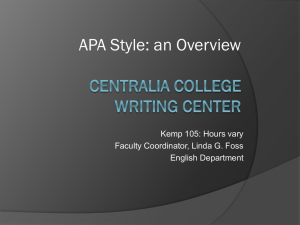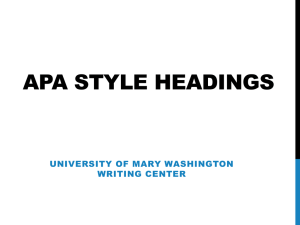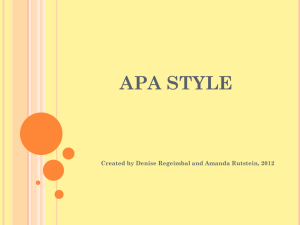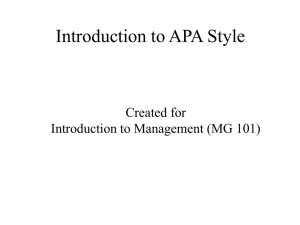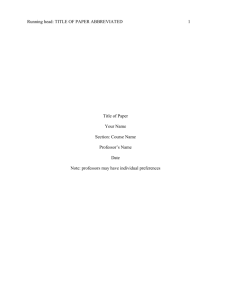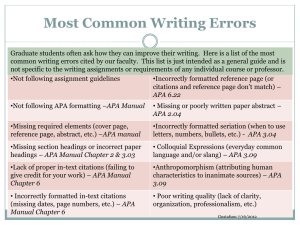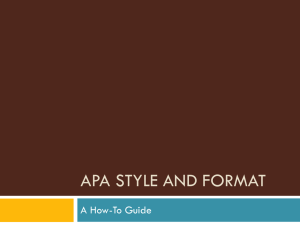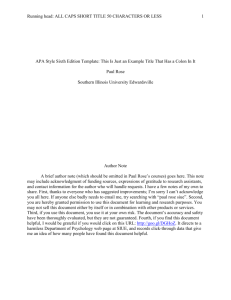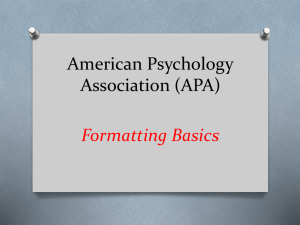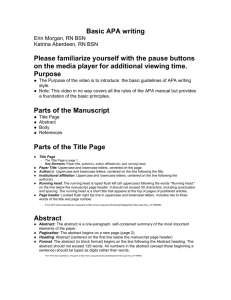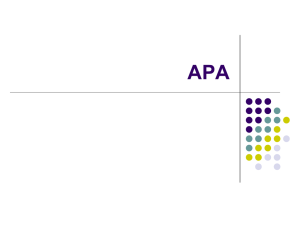APA-style Paper Format - Online Writing Lab
advertisement
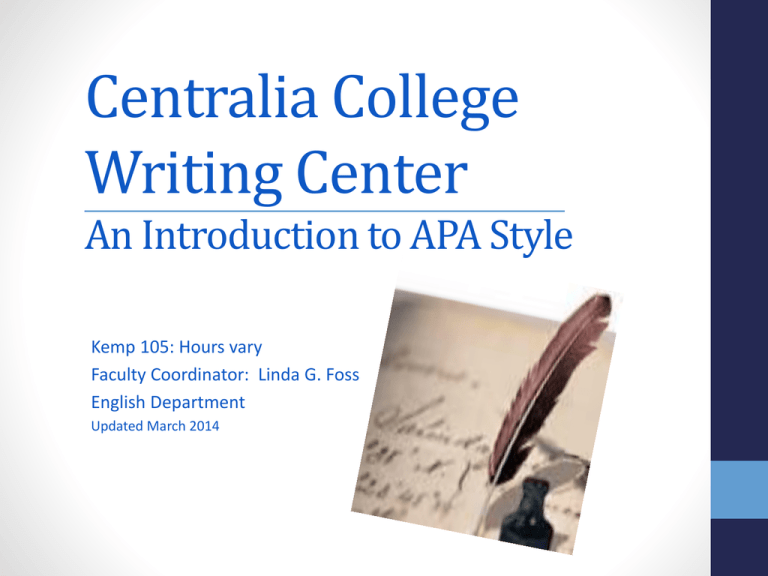
Centralia College Writing Center An Introduction to APA Style Kemp 105: Hours vary Faculty Coordinator: Linda G. Foss English Department Updated March 2014 APA Style Defined APA refers to the American Psychological Association, which determines documentation style and format for research. It is used primarily within the social sciences, medical fields and education, but may be used in any discipline. APA SOURCE The Writing Center relies on the sixth edition of the Publication Manual of the American Psychological Association (2010) for the most current information. The manual is available in the Writing Center. APA Style This presentation will cover: • General APA guidelines • Page format • Section headings • In-text citations • Quotations and summaries • Reference page citations Rule #1: Ask Your Instructor Always follow your instructor’s guidelines and don’t be afraid to ask for information, samples or reliable reference guides. Format: General Guidelines • Margins: One inch on all sides (top, bottom, left, right) • Font: 12-point Times New Roman • Line Spacing: Double-space the entire paper • Spacing after Punctuation: Space once after all punctuation • Alignment: Flush left (creating uneven right margin) • Paragraph Indentations: 5 spaces (or standard ½” tab) • Paper: Use plain white 8 ½ x 11-inch paper. Multiple pages are stapled in the upper left-hand corner. Do not enclose in a binder or file. Format: First Page • If a title page is required, center the title, authors‘ names, course and date. Otherwise, no title page. • Double space everything (including headings) • Put a four-line heading flush left on top margin (your name, instructor’s name, course, and date) • Center the paper title (use standard caps but no underlining, italics, quotation marks, or bold) • Create a header ½” from the top of page with a running head in caps on left and inserted page number on right Format: Section Headings • APA papers are typically divided into major sections: Abstract, Method, Results, and Discussion. These main headings should appear centered, bold-face, and in upper and lower case. • The introductory section to a paper does not require a heading since it is assumed that the first section in your document is an introduction. • Top-down progression is used on headings; for example, if there are three levels of headings, you would use Levels 1, 2, and 3. (See examples on the next slide.) Format: Heading Examples Level 1 Centered, Boldface, Uppercase and Lowercase Heading Level 2 Flush Left, Boldface, Uppercase and Lowercase Heading Level 3 Indented, boldface, lowercase paragraph heading ending with a period. Level 4 Indented, boldface, italicized, lowercase paragraph heading ending with a period. Level 5 Indented, italicized, lowercase paragraph heading ending with a period. Format: Quotations Short quotations should be blended into sentences: • According to some, dreams express “profound aspects of personality” (Foulkes, 2005), though others disagree. • According to the Foulkes study, dreams may express “profound aspects of personality” (2005). Quotations of 40 or more words should blocked: • Start a freestanding block quotation on a new line • Omit quotations marks • Indent the block ½ inch from the left margin (like a new paragraph) • Paragraphs after the first are indented an additional ½ inch Quotations: Editing Tips Brackets indicate words added into quotations: Jan Harold Brunvand, in an essay on urban legends, states: “Some individuals [who retell urban legends] make a point of learning every rumor or tale” (2003). An ellipsis indicates omitted words: In an essay on urban legends, Jan Harold Brunvand notes that “Some individuals make a point of learning every recent rumor or tale . . . and in a short time a lively exchange of details occurs” (2003). Citations: Parenthetical Style • “Whether paraphrasing, quoting an author directly, or describing ideas that influenced your work, you must credit the source” (APA, 2010, p.170). • APA uses a parenthetical, author-date citation system that provides enough information in parentheses for the source to be located on the alphabetical reference list at end of paper. • Information within the parenthetical citations depends on the medium and whether page numbers are visible. Citations: Parenthetical Style In-text Example: Although Russia has regained her autonomy and independence economically in recent years, many citizens are silent in their public opinion (Coleman & McCulloch, 1990). Corresponding References Entry: Coleman, P.G. & McCulloch, A.W. (1990). Societal change, values and social support: Exploratory studies into adjustment in late life. Journal of Aging Studies, 4(4), 321-332. Format: References Page • Begin on a new page • Center the heading: References. • Double space • Align the first line of each citation on left margin • Use ½-inch indent for the second and subsequent lines. Format: References Page • Sources are listed alphabetically by whatever name or major word begins the citation. The listing must correspond to the parenthetical citations within the text. • First and middle names are indicated with initials only • Only the first word and proper nouns are capitalized in article titles • Publication and book titles are italicized Format: Citing Books Author, A. (year). Title of book. Location: Publisher.: Burns, N. (2002). The Chaos Theory. New York: Norton. Editor, A. (year). Title of book. Location: Publisher. Wallace, S. (2010). History of the World. London:Pearson. Author, A. (year). Title of book. URL.: Smith, T. (2012). America. Retrieved from http://www. University of Maryland.edu. Format: Citing Websites Title of article (Date). Retrieval information: New child vaccine gets funding boost. (2001). Retrieved March 21, 2001, from http://news.ninemsn.com.au/health/story Title of webpage (Date). Retrieval information: Learn APA Style. (2012). Retrieved November 7, 2012, from http://www.apastyle.org/learn/ faqs/web-page-no-author.aspx Format: Citing Periodicals Author, A. A., & Author, B. B. (Date of publication). Title of article. Title of Online Periodical, volume and issue number. Retrieved from URL: Bernstein, M. (2002). 10 tips on writing the living Web. A List Apart: For People Who Make Websites, 149. Retrieved from http://www.alistapart.com Author(s) (Date of publication). Title of Article. Title of Periodical, Volume (Issue), pages. Medium of publication. Clark, G. (2001). No more aches and pains. Woman’s Day, 65(1), 54-56. Retrieved from http://proquest.umi.com Format: Citing Lectures and Canvas Notes • Lecture: Professor. (Date/Quarter). Title and Course. Class Lecture. College Name and Location.: Foss, L. (2014, Spring Quarter). Documenting Sources. English 102. Class Lecture. Centralia College, Centralia, WA. • Canvas Notes: Professor. (Date/Quarter). Title and Course. URL.: Foss, L. (2014, Spring Quarter). Documenting Sources. English 102. Retrieved from https://centralia.instructure.com/courses. For comprehensive information about APA style, visit the Writing Center in Kemp 105 or online at http://www.centralia.edu/academics/Writingcenter or http://owl.centralia.edu. You may also visit the APA website at http://www.apastyle.org
